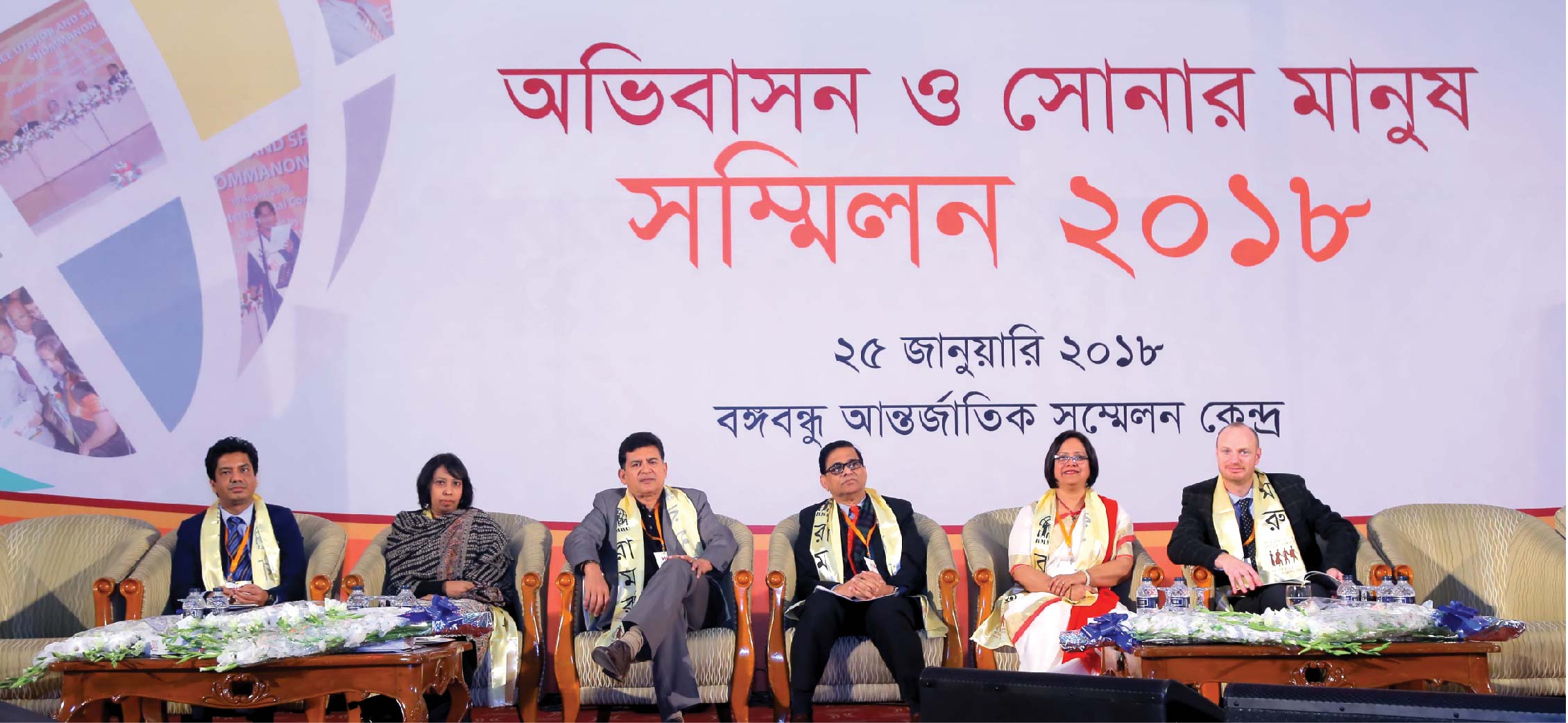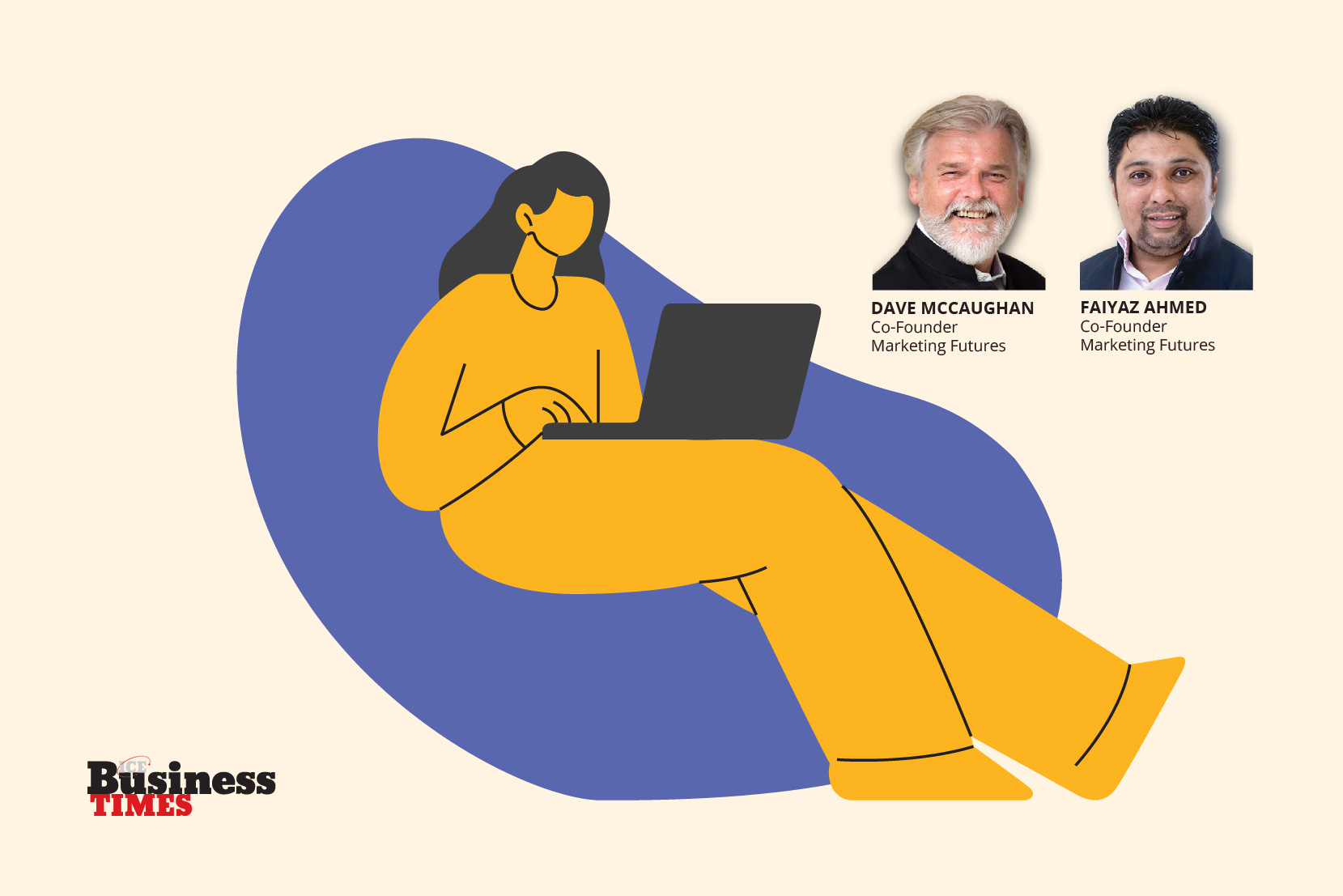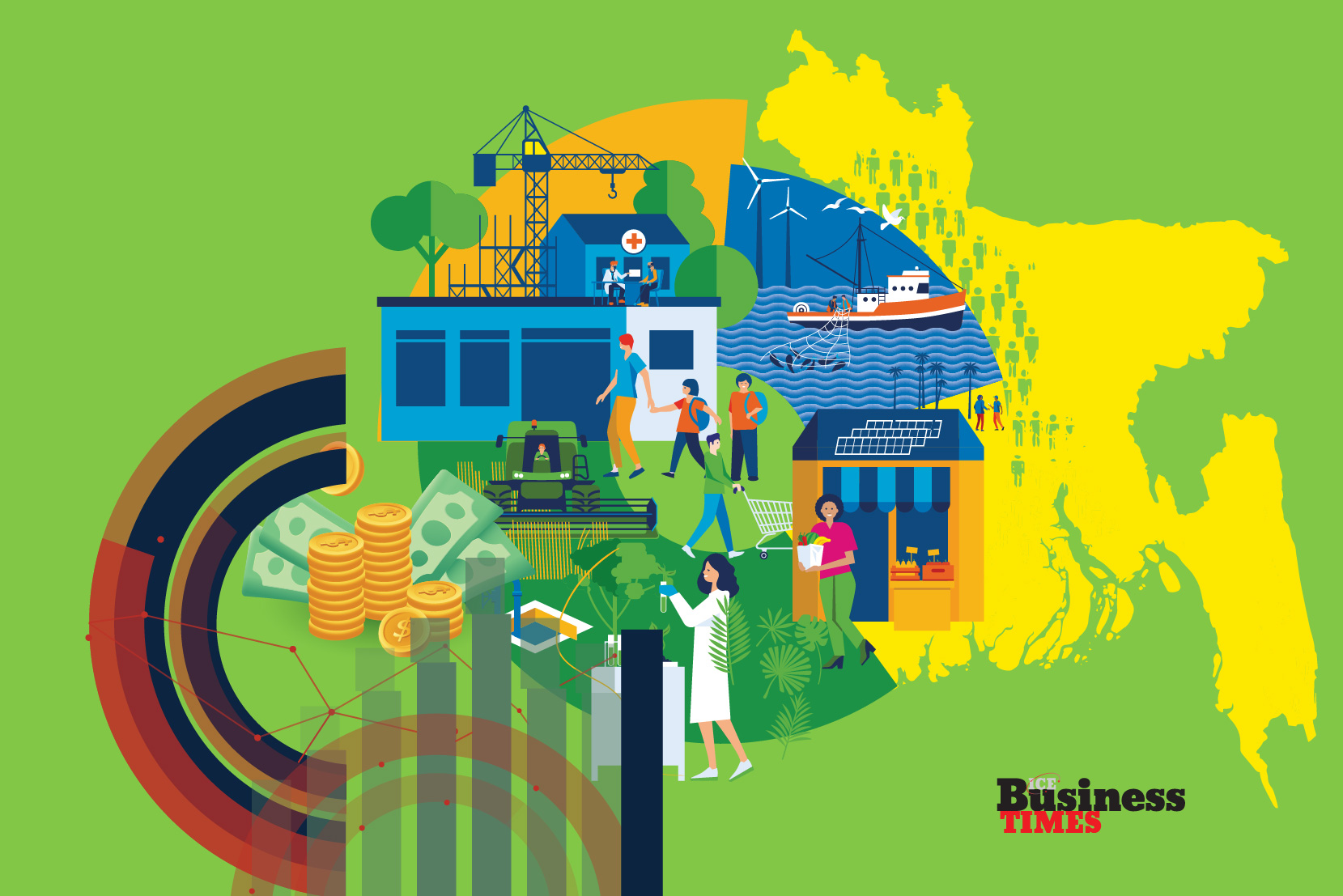Refugee and Migratory Movements Research Unit (RMMRU), a center for evidence-based research and grassroots action think tank, has been working diligently for more than two decades to illuminate the potential of migration to initiate pro-poor growth and poverty reduction in South Asia. Recently, they organized a congregation titled, “Obhibhashon O Shonar Manush Shommilon 2018,”(Migration and the Congregation of Golden human being) at the Bangabandhu International Convention Center (BICC) in Agargaon, Dhaka on 25 January 2018. A proposal for, ‘Migration Vision 2030’ was presented in this congregation to streamline the unseen or a grey area in this field.
According to Bangladesh Bank statistics, total remittances received in December 2017 is $1,167.18 million where International Labour Organization (ILO) estimated that each year more than 400,000 workers leave Bangladesh for overseas employment. The official and unofficial sources said that out of 10 million PBO (People of Bangladeshi Origin) who are spreading across the globe, 90% are non-permanent. With an aim to bring the issues in the ground zero and jotting a strategy for short, mid and long plan for its rapid implementation to redress the predicament of migrants, a panel discussion was held. The discussion was chaired by Dr. Shamsul Alam, Senior Secretary and Member, Bangladesh Planning Commission. The Chief Guest was Dr. Hossain Zillur Rahman, Former Adviser Caretaker Government and Executive Chairman of Power and Participation Research Centre (PPRC). Among the guests, Joel Harding, Senior Governance Adviser, Department for International Development (DFID) and Dr. Shahnaz Karim, Director Society and Team Leader, PROKAS, discussed the pertinent issues. In addition, Marina Sultana Director, Programme RMMRU, offered the welcome speech. Earlier, Dr. Tasneem Siddiqui, Professor of Political Science, University of Dhaka and founding chair of RMMRU, shared the migration vision 2030 with the audience with a call to make the decade 2019 to 2029 the migrant decade.
Fakir Alamgir, a Gono Sangeet singer and the brand ambassador of RMMRU rethemed his legendary song, `”O Sokhina.” In the sideline, there was a fair featuring the Institute of Informatics and Development (IID), Bangladesh Ovhibashi Mohila Sramik Association (BOMSA), International Centre for Climate Change and Development (ICCCAD), WARBE, YPSA. This year RMMRU introduces Sonar Manush Shommanona 2018, and the categories are Shonar Manush Shommanona, Shera Remittance Baboharkari Poribar, District Employment, and Manpower Offices (DEMO), Technical Training Center (TTC) Middleman/Subagent, Recruiting agencies, Bureau of Manpower Employment and Training (BMET). The award winners in the golden son category were Md. Emdadul Haque and Alhaj Md. Shahjahan. The award winner for the best remittance category are Feroza Khanam. The awardees in the Sonar Manush Sheba Award were Amena Parveen, Assistant Director, DEMO, Rangpur; Rahinure Islam, Assistant Director, DEMO, Jessore; Md. Nurul Islam, Principal, BKTTC, Chittagong, and Md. Neaus Sharif, Senior Instructor, TTC, Jessore. In subagent category, the award winners were Nikhil Chandra Paul, Sanowar Hossain, and Rajeda Akhter. In recruiting agencies category, the award winners were Ali Haider Chowdhury, Managing Partner NAC International, and Sahmeem Ahmed Chowdhury Noman, Proprietor Sadia International. A special award was given to Bureau of Manpower Employment and Training. Below are a few excerpts of some of the keynote speeches.

Senior Secretary and Member
Bangladesh Planning Commission
The starting of Bangladesh was a difficult one; our export was very low at the beginning of this nation estate. We had a minimum number of exportables like grey leather and some agro products. Bangladesh started entering the workforce services export market at the end of the 80’s and earned continuous progress. Our exports are still constrained to a few products though there are some diversifications that started very recently. It is an issue for the export market. Our manpower sector expanded widely, and now there are 10 million workers working across the globe including professionals. We earned $4.8 billion from the remittances in 2005 which stood at $15.3 billion in 2015; this is due to the contribution of many. It was $12.8 billion in 2016-2017. Research from BIDS found that 50% of remittance is coming from a non-banking channel. We have projected in seventh Five Year Plan that in 2019-2020 our income from remittances will be $25 billion. There is a lack of stimulus in that area to reach that target.
We will consider the substantial issues raised here and take action to transfer it into policy and implementation from the government sides.
PROPOSAL OF MIGRATION VISION 2030
· Migration Vision 2030 requires implementation in 2030 and in this context suggests that regularization of middleman system and bringing them under the purview of the Migration and Overseas Employment Act, 2013.
· In 2016, 12% of the total migrants were women. In most cases, they are the main bread earners of their families. In this era of feminization, the right of women to participate in the global labor force has to be respected.
· Aces to entry into the global labor market there is no alternative to instilling skill in Bangladesh’s labor force.
· Migration is a multi-causal, and climate change is one of the many influencing factors in migration decision making.
· The policymakers and city planners need to reorient their mindset and think of decentralization of growth centers, development of secondary cities and establishment of low-cost, quick connectivity.
· Policymakers need to include measures that target migrants and members of their families to benefit from mainstream development program.
· Policy consideration needs long-term planning, time-bound execution, resource mobilization, a partnership with civil society and dialogue with the receiving countries.

Former Adviser Caretaker Government &
Executive Chairman of Power and Participation Research Centre (PPRC)
Every year, 2 million new entrants are added to the labor market. It is not possible to employ them within the country. Empirical experience has found that 30% of our employment demand meet up with it. Resultantly, it is contributing to our insistent way forward in a myriad of ways and mainly contributing to economic growth.
It requires going forward with a short-term, mid-term and long-term strategy. The process of going abroad should be made easier, lenient and risk-free.
In competing countries such as Indonesia or Philippines, the state plays a significant role. Two key factors that play a significant role for the migrant worker in their workplace: the strength of their network and the strength between the migrant’s host states and their respective nations. Finally, their return to the host country has to be made accessible. There are noticable changes, but we have to speed it up to ensure progress.
As seen in the changing global scenario, some opportunities of migration are being taken away from us at the same time some opportunities are opening to us. The necessary point is to start internal training and learning process to grasp the new opportunities.

Senior Governance Adviser
Department For International Development (DFID)
Any policy changes or policy implementation in this field require to include the voices of the migrants. It looks like a celebration when civil society, government, private sectors and migrant community are assembled under one roof. The real challenges are to make the immigration seekers free from the clutches of middlemen and giving women freedom of choice.
There is a need for a new policy framework as people will seek more migration due to the adverse impacts of climate changes. It implicates a durable solution for the migrants. Developing a real vision for the migrant is a long-term process which is a collective effort of all stakeholders and partnering communities involved such as the government, academics, think tanks, civil society representatives and the private sector. A consensus is required; parliamentarians have to know it as they can make laws or regulations for policy and its implementation. Bangladesh’s leadership in regards to sending a huge number of migrants is appreciable as well as the work of Bangladeshi migrants that contribute to the notable betterment of their host countries. The money they are sending back to Bangladesh is also incredibly important. I would like to commend the actors for this success.
RMMRU ANNUAL MIGRATION TRENDS REPORT-2016
(PATTERNS AND TRENDS OF LABOUR MIGRATION-2017: ACHIEVEMENTS AND CHALLENGES)
· From Jan 2017 to November 931,832 people have migrated to the Middle East and Arab countries.
· The number of Bangladeshi nationals migrating to different countries around the world has seen a 34.15% increase this year.
· Remittance inflow stood at $12.37 billion between January and November, and the amount was lower than last year’s receipts, which was $13.61 billion, by 0.89%.
· Bangladesh has witnessed a declining trend in remittance inflow despite a rise in labor migration for the second consecutive year.
· Low oil price and tightening of fiscal policies in the Gulf and other Arab countries, Brexit, fraudulence in current migration system, fall in prices, growing number of returnees of migrants, and significant changes in the Islami Bank’s board of directors had contributed to the fall.
· This year, 513,862 Bangladeshis migrated to Saudi Arabia, while 83,169 and 83,016 went to Malaysia and Oman.
· A total of 103,034 people from Comilla went abroad in the past 11 months, which was the higher than the other areas of the country and nearly 10.62% of the total migrated people.
· A total of 113,009 women had migrated to different countries in 2017, which was about 12.1% of the total migration and 4.6% higher than last year’s and this is a very positive development.
· A total of 11 million Bangladeshis went abroad with jobs since 1976; there was hardly any information on the number of workers who had returned since then.
· Around 44% workers returned home for various reasons, including lack of jobs.
· Around 19.31% remittance came through Islami Bank this year which was over 30% in the previous years. The change in its board of directors has badly affected the remittance collection.
· Of the total amount of remittance, 17.15% came from Saudi, 15.97% from the UAE, 13.77% from the US, 7.53% from Malaysia and 7.38% from the UK.
· The fraudulent practices in the process of migration were also adversely affecting the migrant worker’s income.
· Though people were being subjected to deception by giving money for migration most of them were unwilling to go to court to avoid the long legal procedure.

Director Society and Team Leader
PROKAS
The British Council aims to support Bangladesh as a prosperous, secure and a democratic country by building greater public confidence in demographic institutions, empowering and educating civil society, and assisting Bangladesh in meeting the Sustainable Development Goals (SDG). Our societal portfolio’s competence is strengthening the citizen’s engagement. We need to produce stable, secure and open societies through four key intervention areas: the first area is civil society and governance, the second is empowering women and girls, the third is the rule of law and access to justices, and the fourth is a social enterprise.
The government is working very hard to ensure fair migration by formulating new laws and policies and also decentralizing a few functions of migration up to district level. The government has also made space for the involvement of CSO to ensure migrant rights.
Bangladesh is both an inspiration and a challenge for policymakers and practitioners of development. Despite many developments in the migration sector, it is still evident that widespread challenges remain in this sector. Bangladesh with the correct policies and timely actions can move up within the middle-income brackets.

Professor Political Science
University of Dhaka
Founding Chair, RMMRU
This congregation demands that we go forward with migration vision 2030 which will ensure to bring the migration sector under good governance. We gained a lot of knowledge from the research of RMMRU, and through that, we want to influence the policy. We organized the Sonar Manush award this time and would also like to have a policy framework for the preview of SDG. There have been a new minister since 2001, and many changes have happened but the targeted program have not yet been achieved. We aim to create a file system so the migrants can get the benefits of the development works of the country and are not only used as currency earners. They have every right to get the benefits of the development work. The degradation of climate coupled with the fact that the international compact on migration is yet to be prepared means that we have to take measures internally. We must prepare policies that are in sync with the SDG.















